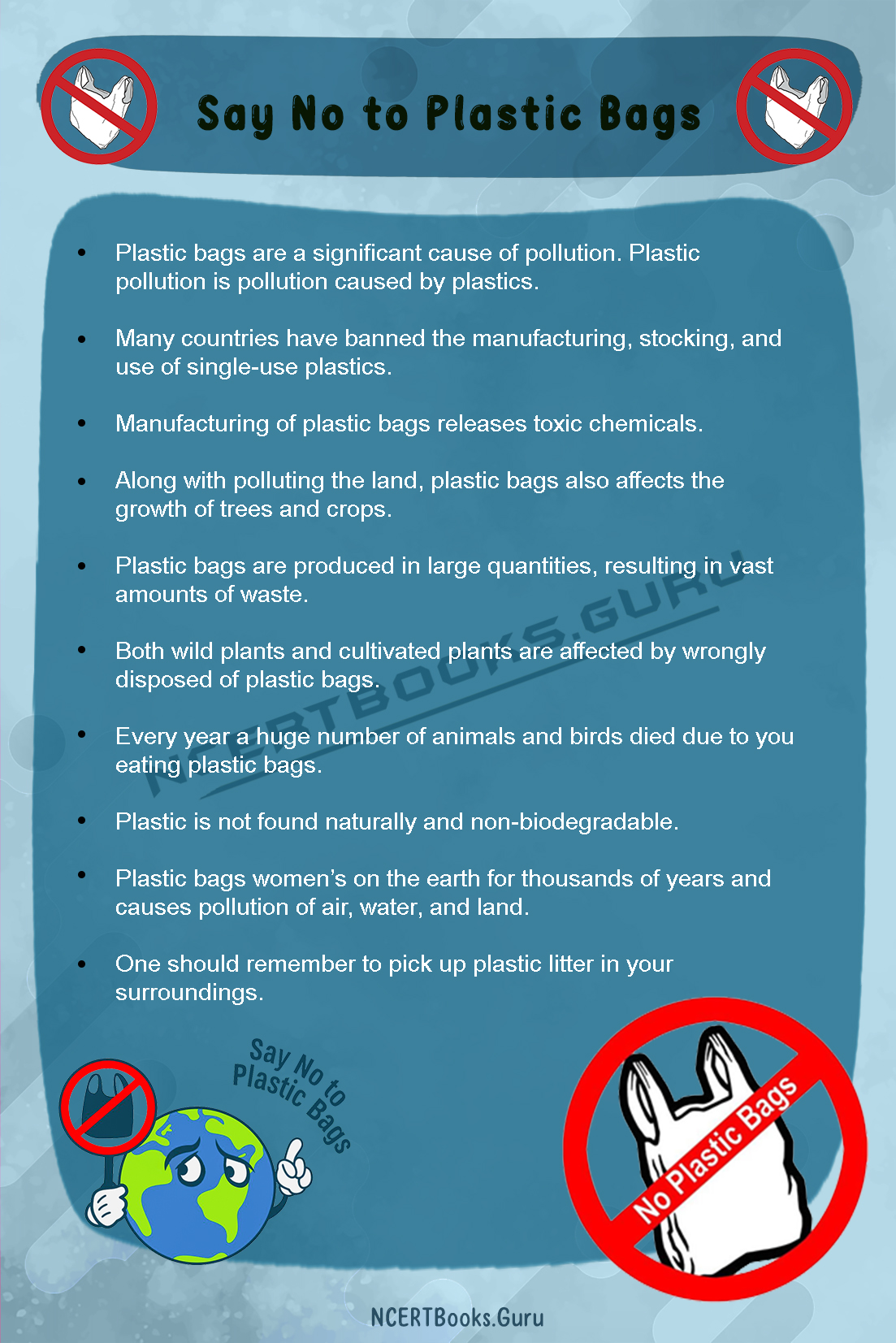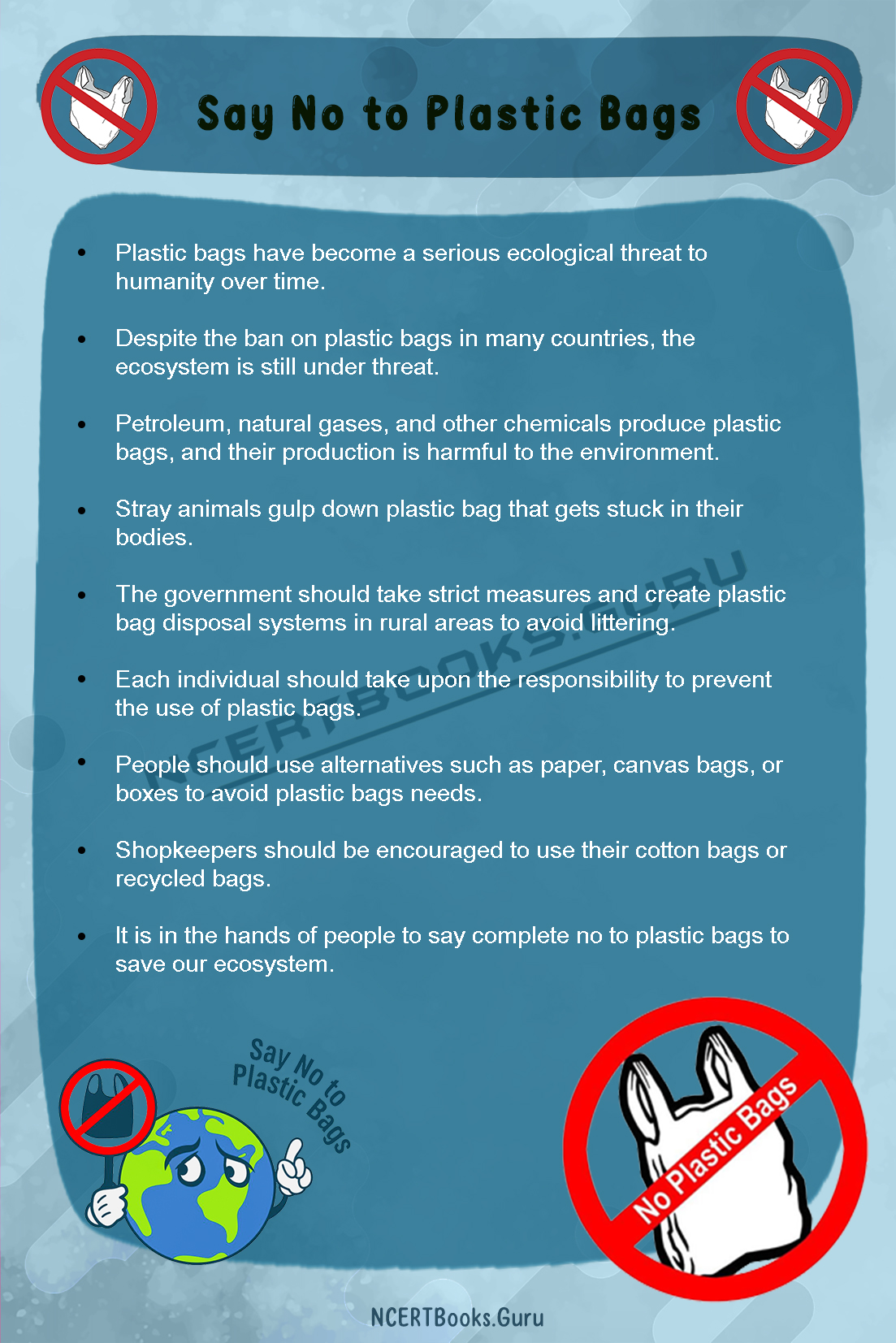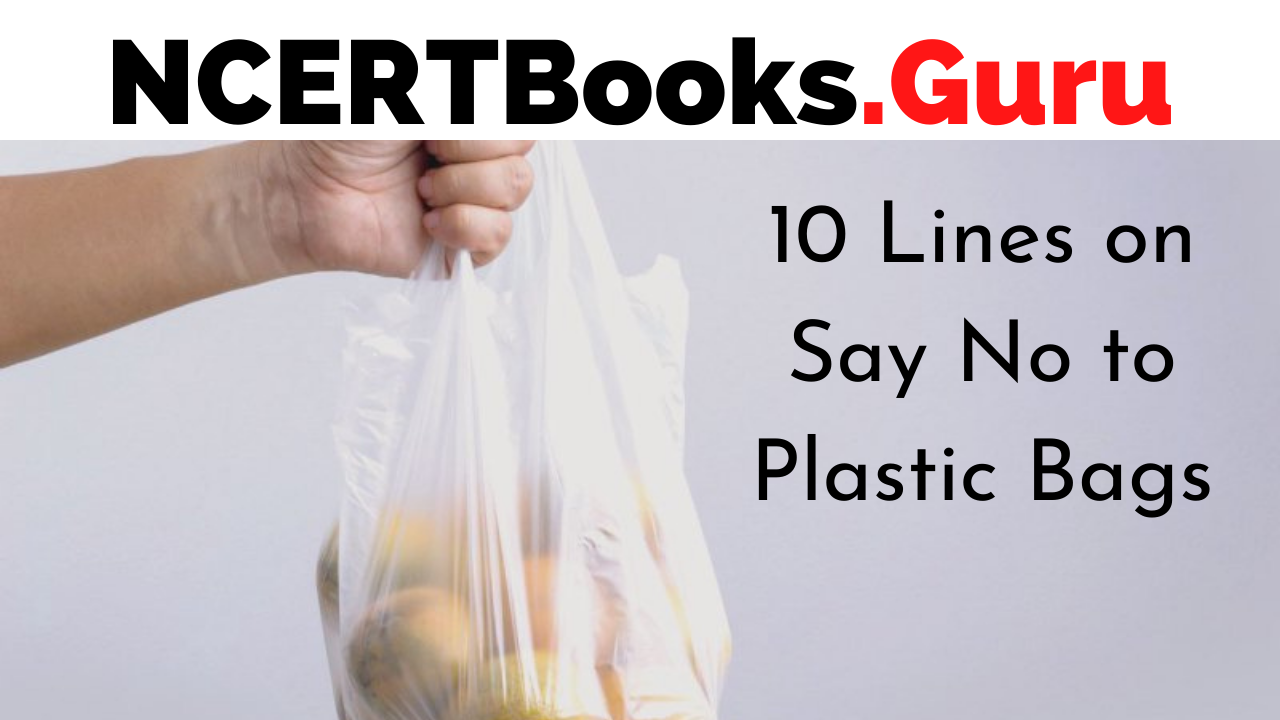10 Lines on Say No to Plastic Bags: A synthetic bag, polybag, or pouch is a type of container made of light, flexible plastic film, non-woven fabric, or plastic textile. Plastic bags are used to hold and transport goods such as foods, ice, magazines, chemicals, and wastes.
Many countries are introducing legislation to phase out lightweight plastic bags because plastic never entirely breaks down. It causes everlasting pollution of plastics and impacts the environment severely. Open bags with bearing handles are used in large numbers by shops and stores. However, some locations are working towards a phase-out of plastic bags because of environmental and litter problems.
Enhance your vocabulary and writing skills with 10 Lines Essays available. Spark up the creativity in you and access various Topics on 10 Lines all in one place.
Set 1 – 10 Lines on Say No to Plastic Bags for kids
Set 1 is helpful for students of Classes 1, 2, 3, 4 and 5.
- Plastic bags are a significant cause of pollution. Plastic pollution is pollution caused by plastics.
- Many countries have banned the manufacturing, stocking, and use of single-use plastics.
- Manufacturing of plastic bags releases toxic chemicals.
- Along with polluting the land, plastic bags also affects the growth of trees and crops.
- Plastic bags are produced in large quantities, resulting in vast amounts of waste.
- Both wild plants and cultivated plants are affected by wrongly disposed plastic bags.
- Every year a huge number of animals and birds died due to you eating plastic bags.
- Plastic is not found naturally and is non-biodegradable.
- Plastic bags women’s on the earth for thousands of years and cause pollution of air, water, and land.
- One should remember to pick up plastic litter in your surroundings.

Set 2 – 10 Lines on Say No to Plastic Bags for School Children
Set 2 is helpful for students of Classes 6, 7 and 8.
- Plastic bags are hazardous, and only one out of twenty plastic bags are reused or recycled.
- Plastic bags pose a notable threat to the environment and deplete and natural resources.
- Plastic bags are lighter than water and hence float on the water surface, preventing air from mixing with water.
- More than one lakh animals died due to poisoning following the consumption of plastic bags.
- The process of burning plastic bags releases toxic gases that can kill or even poison living things and create air pollution.
- Plastic bags are extremely light in weight, so they are quickly scattered from one place to another by air.
- Plastic bags are sometimes consumed by Marine organisms who mistake them for food.
- A person who consumes infected fishes, crabs, or other sea creatures also remains at risk of getting affected.
- Plastic bags effect cultivated land as it spoils the quality and makes them less fertile.
- Plastic bags are mostly preferred because they are economical as well as very lightweight and easy to use. Their damaging impacts on the environment and health are often overlooked.
Set 3 – 10 Lines on Say No to Plastic Bags for Higher Class Students
Set 3 is helpful for students of Classes 9, 10, 11, 12 and Competitive Exams.
- Plastic bags have become a serious ecological threat to humanity over time.
- Despite the ban on plastic bags in many countries, the ecosystem is still under threat.
- Petroleum, natural gases, and other chemicals produce plastic bags, and their production is harmful to the environment.
- Plastic bags seep into the soil after breaking down and remained there, causing infertility in soils. The chemical hampers the earth and interferes with agriculture.
- Stray animals gulp down plastic bag that gets stuck in their bodies.
- The government should take strict measures and create plastic bag disposal systems in rural areas to avoid littering.
- Each individual should take the responsibility to prevent the use of plastic bags.
- People should use alternatives such as paper, canvas bags, or boxes to avoid plastic bags needs.
- Shopkeepers should be encouraged to use their cotton bags or recycled bags.
- It is in the hands of people to say complete no to plastic bags to save our ecosystem.

Frequently Asked Questions on Say No to Plastic Bags
Question 1.
What are plastic bags made up of?
Answer:
Polythene is used to produce traditional plastic bags, consisting of long chains of ethylene monomers. Ethylene is obtained from natural gas and petroleum.
Question 2.
What is the best alternative to plastic bags?
Answer:
The best alternative to plastic bags is jute or hessian sacks. Canvas and cotton bags can be used hundreds of times without damage and are environment friendly. In urgent needs, paper bags can act as great alternatives as well.
Question 3.
How are plastic bags disposed of?
Answer:
Generally, the used plastic bag is supposed to be dropped and disposed of at the recycle bin. However, most of the time, synthetic bags are dumped randomly on roads and lands, causing hazards.
Question 4.
What effects do plastic bags have on drains?
Answer:
Plastic bags clog gutters and drains, causing water and sewage to overflow and become breeding Grounds of germs and bacteria that cause disease. Plastic bags are now among the top items of debris found along most coastlines.
